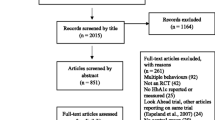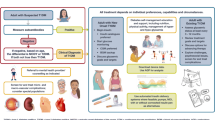Abstract
This article reviews selected recent literature on adult diabetes patient-centered adherence to diabetes care recommendations. We describe more fully a limited number of articles that have particular lessons for diabetes clinicians and researchers. Each article was reviewed for methodology, adherence measures, and types of outcome data collected. This process produced a few studies evaluating an intervention to promote adherence, subsequent targeted behavior changes, as well as health outcomes. Using a standard measure of diabetes self-care adherence over multiple studies may be an important way to compare results across diverse interventions. Advances in research designs and measures show promising results for understanding and enhancing adherence in adults coping with diabetes. Much more behavioral research in diabetes is needed in order to significantly improve the health and quality of life in this population.
Similar content being viewed by others
References and Recommended Reading
Dunbar-Jacob J, Erlen JA, Schlenk EA, et al.: Adherence in chronic disease. In Annual Review of Nursing Research, vol 18, 2000: Focus on Chronic Illness. Edited by Fitzpatrick J, Goeppinger J. New York: Springer Publishing Company; 2000:48–90. An excellent review of the adherence literature across chronic diseases by a renowned research group.
Haynes RB: Improving patient adherence. In Compliance in Healthcare and Behavior. Edited by Burke LE, Okene IS. Armonk, NY: Futura Publishing Company; 2001:3–21. This author provides an updated chapter from his decades of research and it is published in this new comprehensive book on compliance.
Roter DL, Hall JA, Merisca R, et al.: Effectiveness of interventions to improve patient compliance: a meta-analysis. Med Care 1998, 36:1138–1161.
Norris SL, Engelgau MM, Venkat Narayan KM: Effectiveness of diabetes self-management training in type 2 diabetes: a systematic review of randomized controlled trials. Diabetes Care 2001, 24:561–587. This review, prepared by researchers at the Centers for Disease Control and Prevention, fills a large gap in the evidence for efficacy of diabetes self-management education.
Norris SL, Lau J, Smith SJ, et al.: Self-management education for adults with type 2 diabetes: a meta-analysis of the effect on glycemic control. Diabetes Care 2002, 25:1159–1171. This meta-analysis performed by the Centers for Disease Control researchers provides clarity to the evidence for self-management education.
Schechter CB, Walker EA: Improving adherence to diabetes self-management recommendations. Diabetes Spectrum 2002, 15:170–175.
Green LW, Kreuter MW: Health Promotion Planning, edn 3. Mountain View, CA: Mayfield Publishing Company; 1999.
Anderson B, Funnell M: The Art of Empowerment: Stories and Strategies for Diabetes Educators. Alexandria, VA: American Diabetes Association; 2000.
Wagner EH: Chronic disease management: what will it take to improve care for chronic illness? Eff Clin Pract 1998, 1:2–4.
Dunbar-Jacob J, Sereika S: Conceptual and methodological problems. In Compliance in Healthcare and Behavior. Edited by Burke LE, Okene IS. Armonk, NY: Futura Publishing Company; 2001:93–104.
Mainous AG, King DE, Hueston WJ, et al.: The utility of a portable patient record for improving ongoing diabetes management. Diabetes Educ 2002, 28:196–207.
Schillinger D, Grumbach K, Piette J, et al.: Association of health literacy with diabetes outcomes. JAMA 2002, 288:475–482.
Raji A, Gomes H, Beard JO, et al.: A randomized trial comparing intensive and passive education in patients with diabetes mellitus. Arch Intern Med 2002, 162:1301–1304.
Philis-Tsimikas A, Walker C: Improved care for diabetes in underserved populations. J Ambul Care Manage 2001, 24:39–43.
Karter AJ, Ackerson LM, Darbinian JA, et al.: Self-monitoring of blood glucose levels and glycemic control: the Northern California Kaiser permanent diabetes registry. Am J Med 2001, 111:1–9.
Schectman JM, Nadkarni MM, Voss JD: The association between diabetes metabolic control and drug adherence in an indigent population. Diabetes Care 2002, 25:1015–1021.
Ciechanowski PS, Katon WJ, Russo JE, Walker EA: The patient- provider relationship: attachment theory and adherence to treatment in diabetes. Am J Psychiatry 2001, 158:29–35.
Bowlby J: Attachment and Loss, vol 2: Separation: Anxiety and Anger. New York: Basic Books; 1973.
Berg GD, Wadhwa S: Diabetes disease management in a community-based setting. Manag Care 2002, 11:42,45-50.
Standards of medical care for patients with diabetes mellitus [no authors listed]. Diabetes Care 2002, 25:S33–S49.
Graber AL, Elasy TA, Quinn D, et al.: Improving glycemic control in adults with diabetes mellitus: shared responsibility in primary care. South Med J 2002, 95:684–690.
Keyserling TC, Samuel-Hodge CD, Ammerman AS, et al.: A randomized trial of an intervention to improve self-care behaviors in African-American women with type 2 diabetes. Diabetes Care 2002, 25:1576–1583.
Knowler WC, Barrett-Conner E, Fowler SE, et al.: Reduction in the incidence of type 2 diabetes with lifestyle modification or metformin. N Engl J Med 2002, 346:393–403. An important primary prevention trial with positive results, which will lead to future papers describing adherence to the lifestyle and medication interventions.
Haynes RB, McDonald H, Garg AX, Montague P: Interventions for helping patients to follow prescriptions for medications. Cochrane Database Syst Rev 2002, (2):CD000011. The Cochrane review provides an excellent resource for those designing studies and those implementing interventions to promote medication adherence.
Glasgow RE, McKay HG, Piette JD, Reynolds KD: The RE-AIM framework for evaluating interventions: what can it tell us about approaches to chronic illness management? Patient Educ Couns 2001, 44:119–127. Provides the background for the model so that researchers and clinicians can evaluate its applicability to their projects.
Peeples M, Mulkahey K, Tomky D, Weaver T: The conceptual framework of the National Diabetes Education Outcomes System (NDEOS). Diabetes Educ 2001, 27:547–562.
Toobert DJ, Hampson SE, Glasgow RE: The summary of diabetes self-care activities measure. Diabetes Care 2000, 23:943–950. The up-to-date instrument is included in this paper, along with the validity and reliability of the instrument across multiple studies.
Ciechanowski P, Katon WJ, Russo JE: Depression and diabetes: Impact of depressive symptoms on adherence, function, and costs. Arch Intern Med 2000, 160:3278–3285.
Lustman PJ, Anderson RJ, Freeland KE, et al.: Depression and poor glycemic control: a meta-analytic review of the literature. Diabetes Care 2000, 23:934–942. This meta-analysis brings interested readers up to date on the myriad of issues surrounding depression, diabetes, and the metabolic and behavioral roles in each.
de Groot M, Anderson R, Freeland KE, et al.: Association of depression and diabetes complications: a meta-analysis. Psychosom Med 2001, 63:619–630.
Lutfey KE, Wishner WJ: Beyond compliance is adherence. Diabetes Care 1999, 22:635–639.
Glasgow RE, Anderson RM: In diabetes care, moving from compliance to adherence is not enough: something entirely different is needed. Diabetes Care 1999, 22:2090–2092.
Walker EA: Health behavior: from paradox to paradigm. Diabetes Spectrum 2001, 14:6–8.
Trask PC, Schwartz SM, Deaner SL, et al.: Behavioral medicine: the challenge of integrating psychological and behavioral approaches into primary care. Eff Clin Pract 2002, 5:75–83.
Author information
Authors and Affiliations
Rights and permissions
About this article
Cite this article
Walker, E.A., Usher, J.A. Understanding and enhancing adherence in adults with diabetes. Curr Diab Rep 3, 141–148 (2003). https://doi.org/10.1007/s11892-003-0038-5
Issue Date:
DOI: https://doi.org/10.1007/s11892-003-0038-5




